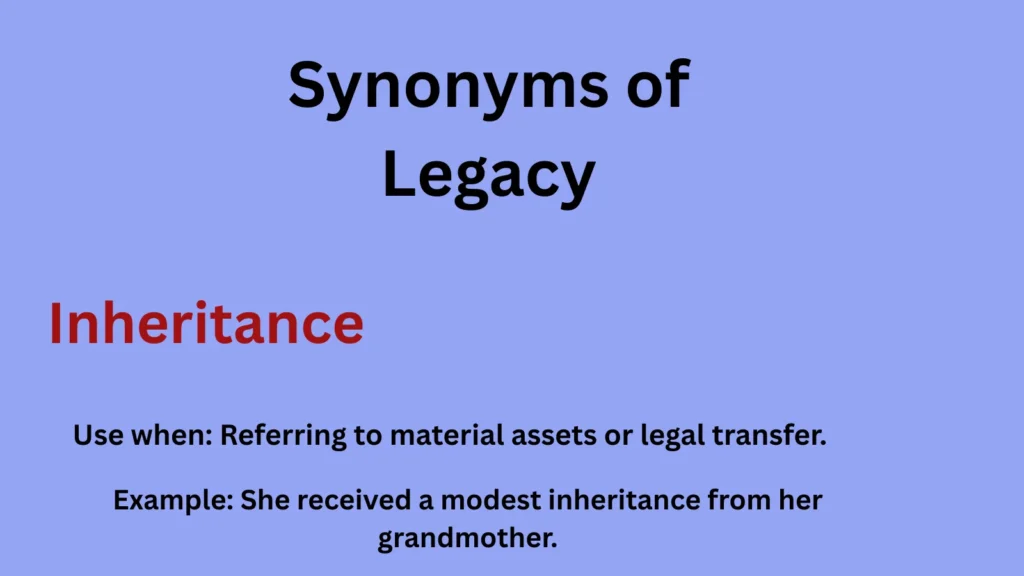Synonyms of legacy, such as inheritance, heritage, bequest, and contribution, capture the lasting impact someone leaves behind, whether tangible or symbolic. For example, a teacher’s influence on generations of students can be seen as a lasting legacy, even without material wealth.
These alternatives help express different kinds of legacies, from financial and cultural to personal and professional. Understanding their subtle differences allows you to choose the right word for any context.
In this guide, we’ll explore powerful synonyms for legacy and how to use them to convey meaning with depth and clarity.
What Does Legacy Mean?
At its core, legacy refers to what is left behind—physically, emotionally, or symbolically. It suggests:
- Continuity: Something that lives on after a person or event.
- Value: Usually carries positive or meaningful connotations.
- Impact: Long-term effect on people, communities, or cultures.
It often has a formal or reflective tone, especially in topics like family, leadership, history, and social change.
30 Synonyms of Legacy (and When to Use Them)
1. Inheritance
Use when: Referring to material assets or legal transfer.
Example: “She received a modest inheritance from her grandmother.”
2. Bequest
Use when: You want a formal or legal-sounding term for something left in a will.
Example: “The museum was founded thanks to a generous bequest.”
3. Heritage
Use when: Emphasizing cultural or ancestral background.
Example: “His music is deeply rooted in African American heritage.”
4. Birthright
Use when: Highlighting something a person is entitled to from birth.
Example: “Freedom is not a privilege—it’s a birthright.”
5. Tradition
Use when: Referring to long-standing customs passed down.
Example: “Family dinners were a beloved tradition.”
6. Contribution
Use when: Focusing on what someone added or gave to a cause or field.
Example: “Her biggest contribution was transforming healthcare policy.”
7. Endowment
Use when: Discussing a financial gift to institutions.
Example: “The library was funded by a private endowment.”
8. Impact
Use when: Highlighting influence or effects left behind.
Example: “His impact on education will be felt for generations.”
9. Footprint
Use when: Talking about ecological or metaphorical marks left behind.
Example: “The company is working to reduce its environmental footprint.”
10. Mark
Use when: Referring to lasting impression or influence.
Example: “She left her mark on the industry with bold leadership.”
11. Imprint
Use when: Suggesting subtle or emotional influence.
Example: “The teacher’s kindness left an imprint on her students.”
12. Gift
Use when: You want to emphasize generosity or emotional resonance.
Example: “Her gift to us was her unwavering optimism.”
13. Memory
Use when: Speaking emotionally or personally about someone’s influence.
Example: “His memory lives on in every story we tell.”
14. Heirloom
Use when: Referring to a physical object passed through generations.
Example: “This ring is a cherished heirloom.”
15. Remembrance
Use when: Focused on honoring someone after their passing.
Example: “A plaque was installed in remembrance of the founder.”
16. Aftermath
Use when: Describing what remains, especially after conflict or trauma.
Example: “The aftermath of war shaped an entire generation.”
17. Influence
Use when: Emphasizing how someone’s ideas or actions continue to shape others.
Example: “Her influence is still visible in the nonprofit world.”
18. Outcome
Use when: Focusing on results or consequences.
Example: “The outcome of his efforts changed the industry.”
19. Result
Use when: For neutral or objective descriptions of what was left behind.
Example: “His policies were the result of years of activism.”
20. Residue
Use when: Highlighting subtle traces, sometimes with negative undertones.
Example: “A residue of mistrust lingered after the scandal.”
21. Echo
Use when: Describing distant but ongoing effects.
Example: “The echo of her words still resonates today.”
22. Relic
Use when: Referring to something from the past with historical value.
Example: “The sword is a relic from the 14th century.”
23. Token
Use when: Indicating a small reminder or symbol of someone’s presence.
Example: “He gave her a token of his gratitude.”
24. Remnant
Use when: Talking about a leftover piece or element.
Example: “The wall is a remnant of the old city.”
25. Memento
Use when: Referring to keepsakes with emotional significance.
Example: “She kept the letter as a memento.”
26. Record
Use when: Highlighting documented achievements or histories.
Example: “The record of his service speaks for itself.”
27. Archive
Use when: Talking about preserved collections or documents.
Example: “The university holds an archive of her works.”
28. Chronicle
Use when: Referring to detailed historical accounts.
Example: “The book is a chronicle of their family’s journey.”
29. Lineage
Use when: Emphasizing ancestral heritage.
Example: “He came from a royal lineage.”
30. Inheritance of ideas
Use when: Abstract reference to values or principles passed on.
Example: “Democracy is an inheritance of ideas we must protect.”
How to Choose the Right Synonym for Legacy
The key to choosing the right synonym lies in understanding:
1. Tone
- Formal: Bequest, endowment, chronicle
- Emotional: Memory, gift, memento
- Neutral/Objective: Outcome, result, record
2. Context
- Cultural: Heritage, tradition, lineage
- Legal/Material: Inheritance, heirloom, estate
- Symbolic/Emotional: Imprint, echo, token
3. Emotional Weight
- For reverence, choose remembrance, gift, or legacy itself.
- For historical distance, try relic, record, or archive.
- For personal memory, opt for memento, memory, or imprint.
Final Thoughts:
After exploring various synonyms of legacy, it becomes clear that each term—whether inheritance, heritage, bequest, or contribution—brings a unique perspective to what we leave behind. These words help express not just what is passed down, but also the meaning and value attached to it.
By choosing the most fitting synonym, you can highlight emotional, cultural, or material aspects with greater precision.
Let your language honor the lasting influence of people, ideas, or actions, and carry that impact forward with intention and clarity.


